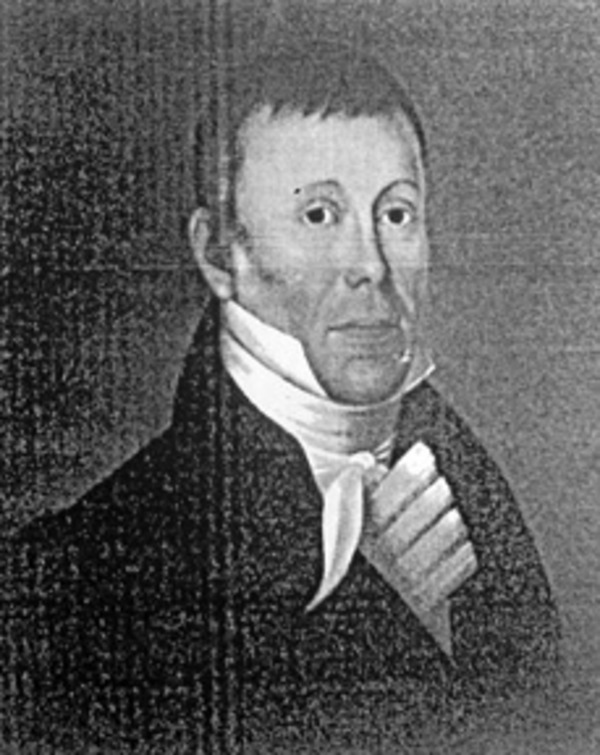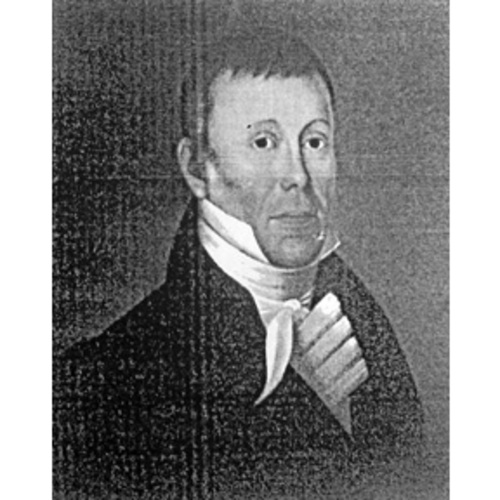
Source: Link
BABY, JAMES (baptized Jacques), politician, office holder, judge, landowner, and militia officer; b. 25 Aug. 1763 in Detroit, son of Jacques Baby*, dit Dupéront, and Susanne Réaume (Rhéaume), dit La Croix; m. secondly 1802 Elizabeth Abbott, and they had five sons and one daughter; d. 19 Feb. 1833 at York (Toronto), Upper Canada.
An elder son of a prestigious family in the Detroit area, James Baby was educated in the province of Quebec under the supervision of his uncle François*. He also took lessons in fencing and dancing, activities esteemed as attributes of gentility. At the conclusion of his studies his father sent him on a European tour, during which Baby married an actress. Soon after, he was recalled by his father who effectively, if not legally, ended the union by providing her with a pension. Baby was then initiated into his father’s commercial affairs and amassed considerable wealth.
Baby’s family had been renowned for its loyalty to the crown since the conquest. After the division of the old province of Quebec in 1791 he became one of western Upper Canada’s foremost office holders. Because of his loyalty and the need to represent the French community in the area, Lieutenant Governor John Graves Simcoe* named him in 1792 to the Executive and Legislative councils and the county lieutenancy of Kent. Surveyor General David William Smith* noted the probable influence of Baby’s uncle with Lord Dorchester [Guy Carleton*]: “The Interest which brought the Young French Gentleman into the Councils, has prevailed in having him appointed Lord Lieutenant for the County of Kent, & that interest was not only planted previous to the Governments taking place, but seems to have taken exuberant Root in Quebec; where his [James’s] Consequence, his Interest, his Property, & his Loyalty, seem to have been blazoned in lively tropes.” Baby was also named to the first Heir and Devisee Commission and in January 1799 was, with Alexander Grant* and Thomas McKee*, temporarily appointed to the office of deputy superintendent general of Indian affairs.
When in 1793 Baby accepted an appointment from Simcoe as judge of the Surrogate Court for the Western District he noted: “The thought that I may be useful, particularly to our poor Canadians who have no other support here but me, makes me inclined to put up with everything, whatever my reluctance.” The next year Baby and Richard G. England*, the commandant of Detroit, organized the local militia, many of whom were French Canadians; in part, Baby’s role was to secure the loyalty of his people. During the crisis in Indian-American relations in 1794, Baby worked, again with England, to prepare the militia. Simcoe commended him for his efforts and put the 1st Kent Militia under his command. Following Jay’s Treaty of November 1794, the Baby family abandoned considerable property in the Detroit region and moved to Sandwich (Windsor), where they built a residence and store.
Baby augmented his finances by acquiring large amounts of land in various parts of Upper Canada, through entitlement and by purchase. In the period from 1793 to 1800 he bought town lots in Sandwich, Newark (Niagara-on-the-Lake), and York where he also received 200 acres for a house appropriate to an executive councillor. In 1793 he secured 3,000 acres in his father’s name, 1,200 acres for his mother, and 1,200 acres for each of his brothers – lands which were located in Yarmouth Township. Land records for 1805 indicate that Baby had 7,000 acres in Yarmouth which he had received as the transferee of these individuals, as well as 4,600 in Dorchester Township (North and South Dorchester townships), 246 acres in Harwich Township, and 180 acres in Malden Township. The same records reveal that, although he was entitled to 6,000 acres as an executive councillor, he was only to receive 5,300 because of possible conflicts with other claimants. In addition, he claimed small acreages in Aldborough and Sandwich townships and 1,500 acres in Dunwich Township; he surrendered his title to the latter in 1806.
At the outbreak of the War of 1812 Baby led the militia from Sandwich to Amherstburg. His own family was forced to flee when the invading American army entered Sandwich on 13 July and the Baby home was pillaged. He was with Major-General Henry Procter’s force of regulars, militia, and Indians at the disastrous battle of Moraviantown on 5 Oct. 1813. Baby was taken prisoner but released shortly after. He had sustained considerable losses. The damage to his home alone was estimated at almost £600 and he was never compensated. His greatest loss in these years, however, was his second wife, who died during an epidemic of fever in the winter of 1812–13. Tired, ill, with young children, and stricken with grief, Baby retired to Quebec late in 1813 for rest and medical care.
In 1815 Baby was appointed inspector general and moved to York where, with his five sons, he built a home on an estate with 1,500 acres of uncultivated land. He attended to his administrative and political duties faithfully and only on rare occasions missed a meeting of the Executive Council. In the capital he enjoyed the friendship of John Strachan* (one of the executors of his estate), John Beverley Robinson*, George Herchmer Markland*, and Thomas Clark. Like Baby himself, they were members of the so-called “family compact.” His conservatism, his traditional Roman Catholicism, which inculcated respect for authority, and his refusal to accept American democratic ideas made him a natural part of this group. In addition to the inspector generalship, Baby took on other tasks. He was one of the commissioners of forfeited estates charged with settling the property affairs of men such as Abraham Markle who had been traitors during the war. More important, early in 1823 he was appointed Upper Canada’s arbitrator in the dispute over the sharing of customs revenues with Lower Canada. He was surprised and flattered. Writing to a friend, he exclaimed: “I have become a great man, no less than Arbitrator for Upper Canada. What think you of this, a Canadian from Upper Canada to settle matters embarrassed by Lower Canada.” The arbitration was successful and ended an acutely difficult period in the province’s financial history. By 1827 Baby’s influence was diminishing. He had become largely dependent on his emoluments from office to support his family. Historian John Charles Dent* suggests this reliance compromised him politically. For instance, on one occasion, Baby voted against his conscience and with the administration on the issue of taxing wild lands.
While at York Baby continued to speculate in land. In 1830 he and ten other men, including his brother François*, were speculating in the Lake St Clair area of the Western District and encountering stiff opposition from Thomas Talbot*. Avoidance of taxation by speculators was a common occurrence in the early 19th century and Baby was no exception. On a large number of his properties he failed to pay his taxes and as a consequence stood to lose more than 9,000 acres. The law, however, allowed those in arrears to redeem their property and Baby did. In addition to his activity in the land market, he continued to receive land for his services to government. As a militia colonel he was allowed 1,200 acres, which he sought in Vespra Township. He died, however, before the transactions could be finalized, and 26 years later his only surviving executor (Strachan) was still involved in the legal ramifications.
At a period when pluralism of office was common, James Baby was an office holder par excellence; between 1792 and 1830 he held more than 115 appointments or commissions of varying degrees of importance. Gracious and distinguished, he was the epitome of a gentleman. He was an impressive figure – clean-shaven, tall, good-looking, and well proportioned – and possessed, according to his grandson, a “primitive simplicity” and a “moral beauty.” Strachan eulogized him as “a Christian without guile, affable and polished in his manners, courteous in his conversation, dignified in his deportment, warm in his affections, steady in his friendships and unshaken in his principles and the spring of all his actions was of the religious.” A stalwart member of the Roman Catholic community, he played a key role in building York’s first Catholic church, St Paul’s. In his leisure he enjoyed fishing and gardening. His funeral was well attended, and shops and offices were closed in his honour. He was buried in St Paul’s churchyard and later was reinterred at Sandwich.
Numerous references to Baby may be found in the following collections: AO, MS 498; Arch. of the Archdiocese of Toronto, M (Macdonell papers); PAC, RG 1, L1 and L3; RG 5, A1; RG 8, I (C ser.); and RG 68, General index, 1651–1841.
Corr. of Hon. Peter Russell (Cruikshank and Hunter). Corr. of Lieut. Governor Simcoe (Cruikshank). J. C. Dent, The story of the Upper Canadian rebellion; largely derived from original sources and documents (2v., Toronto, 1885), 1: 140, 215–18. John Askin papers (Quaife). Armstrong, Handbook of Upper Canadian chronology (1967). H. J. Morgan, Sketches of celebrated Canadians. [E. A.] Baby, Mme C.-E. Casgrain, Mémoires de famille: l’honorable C.-E. Casgrain (Rivière-Ouelle, Qué., 1891). W. L. Baby, Souvenirs of the past, with illustrations: an instructive and amusing work, giving a correct account of the customs and habits of the pioneers of Canada . . . (Windsor, Ont., 1896), 58–71. P.-B. Casgrain, Mémorial des familles Casgrain, Baby et Perrault du Canada (Québec, 1898). [A. J. Dooner, named] Brother Alfred, Catholic pioneers in Upper Canada (Toronto, 1947). Joseph Tassé, Les Canadiens de l’Ouest (4e éd., 2v., Montréal, 1882). F. H. Armstrong, “The oligarchy of the Western District of Upper Canada, 1788–1841,” CHA Hist. papers, 1977: 87–102. John Clarke, “The role of political position and family and economic linkage in land speculation in the Western District of Upper Canada, 1788–1815,” Canadian Geographer (Toronto), 19 (1975): 18–34.
Cite This Article
John Clarke, “BABY, JAMES (baptized Jacques),” in Dictionary of Canadian Biography, vol. 6, University of Toronto/Université Laval, 2003–, accessed May 29, 2025, https://www.biographi.ca/en/bio/baby_james_6E.html.
The citation above shows the format for footnotes and endnotes according to the Chicago manual of style (16th edition). Information to be used in other citation formats:
| Permalink: | https://www.biographi.ca/en/bio/baby_james_6E.html |
| Author of Article: | John Clarke |
| Title of Article: | BABY, JAMES (baptized Jacques) |
| Publication Name: | Dictionary of Canadian Biography, vol. 6 |
| Publisher: | University of Toronto/Université Laval |
| Year of revision: | 1987 |
| Access Date: | May 29, 2025 |



